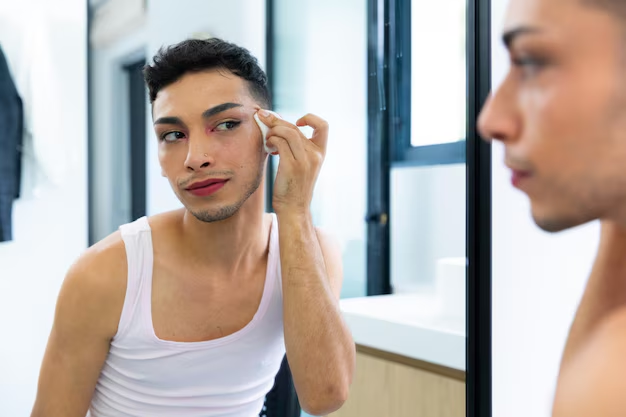Understanding Rosacea: How to Determine If You Have It
Have you ever noticed persistent redness on your face that just won't go away? Or maybe you've experienced other skin symptoms that have made you wonder if you might have rosacea. With so many skin conditions that share similar characteristics, it can be challenging to determine what exactly you’re dealing with. Rosacea is a complex skin disorder that typically affects the face, making it a topic of concern for those who value clear skin. In this article, we'll explore the signs and symptoms of rosacea, explain potential triggers, and provide useful insights into managing the condition effectively.
What Is Rosacea?
Rosacea is a chronic skin condition characterized by facial redness and, often, small, red, pus-filled bumps. It primarily affects the central part of the face, including the cheeks, nose, and forehead, though it can also appear on the neck and chest. Those with fair skin are more susceptible, but it can affect anyone. Key symptoms to identify rosacea include persistent redness, visible blood vessels, and, in some cases, eye irritation.
Types of Rosacea
Rosacea is not a one-size-fits-all condition. Knowing the type you are dealing with can help guide your management approach. There are four main subtypes:
- Erythematotelangiectatic Rosacea (ETR): Primarily characterized by facial redness and visible blood vessels.
- Papulopustular Rosacea: Often resembles acne and includes redness, swelling, and acne-like breakouts.
- Phymatous Rosacea: Causes the skin to thicken and sometimes leads to a bulbous nose.
- Ocular Rosacea: Affects the eyes, causing redness, irritation, and swollen eyelids.
Recognizing the Symptoms
Persistent Redness
This is one of the most prevalent signs of rosacea. If your face often looks flushed or sunburned without external factors like heat or sun exposure, it might be more than just blushing. Pay attention to how often it occurs and if it's accompanied by other symptoms.
Visible Blood Vessels
Dilated blood vessels can become visible beneath the skin, contributing to the appearance of redness. Check your nose, cheeks, and forehead for tiny, thread-like veins.
Acne-like Breakouts
Unlike typical acne, rosacea breakouts don’t have blackheads. Instead, you might see small red bumps or pus-filled pimples. These often occur together with inflammation and general skin sensitivity.
Eye Irritation
Ocular rosacea is a lesser-known aspect but can be very discomforting. Symptoms include watery or bloodshot eyes, a gritty feeling, and swollen eyelids. These signs often go unnoticed and can lead to serious eye conditions if not acknowledged.
Triggers of Rosacea Flare-ups
Understanding what causes rosacea symptoms to worsen is crucial for managing the condition. Below are some common triggers:
- Hot or spicy foods
- Alcohol consumption
- Extreme temperatures
- Sun exposure
- Stress and anxiety
- Exercise
- Certain skincare products
It's beneficial to keep a trigger diary, noting foods, activities, or emotions that coincide with flare-ups. This self-awareness can empower you to make informed decisions about lifestyle adjustments.
Managing Rosacea
While there is no cure for rosacea, there are several strategies to manage it effectively. Consulting with a dermatologist will provide personalized insights tailored to your skin's needs. Meanwhile, here are some general tips:
Skincare Routine
Choose skincare products that are gentle and specifically formulated for sensitive skin. Avoid known irritants like alcohol-based products, exfoliants, and fragrances that can exacerbate symptoms. Look for moisturizers and cleansers labeled as hypoallergenic or designed for rosacea.
Sun Protection
Ultraviolet (UV) rays can worsen rosacea. Applying a broad-spectrum sunscreen with an SPF of at least 30 can protect your skin from harmful rays. Wearing a wide-brimmed hat and seeking shade when the sun is intense is also wise.
Diet and Nutrition
Maintaining a balanced diet can help keep your skin healthy. Consider avoiding items listed in your trigger diary, and focus on foods rich in omega-3 fatty acids, such as fish and nuts, which may have anti-inflammatory properties.
When to Seek Professional Help
If you notice persistent symptoms consistent with rosacea, it's time to seek advice from a healthcare provider. Early consultation ensures proper evaluation and management. You'll be equipped to handle symptoms more effectively and maintain your skin's health.
Medical Treatments
Your dermatologist may prescribe topical medications or oral antibiotics, depending on the severity of your symptoms. For more advanced cases, laser therapy could offer additional benefits by reducing visible blood vessels.
The Emotional Impact of Rosacea
Living with rosacea doesn't just affect physical appearance; it can also impact emotional well-being. It's common to feel self-conscious or anxious about flare-ups. Finding support, whether through a therapist specializing in dermatological issues or rosacea support groups, can prove immensely beneficial.
Empowering Yourself with Knowledge
The uncertainty surrounding rosacea can be daunting, especially when dealing with fluctuating symptoms. However, educating yourself and staying informed about new treatments and management strategies can offer peace of mind. Regular check-ups with your dermatologist and staying engaged with skincare advancements keep you prepared for whatever challenges arise.
Wrapping Up
Understanding whether or not you have rosacea is a crucial first step in taking control of your skin health. By recognizing symptoms, identifying triggers, and adopting management strategies, you can significantly reduce the impact rosacea has on your life. Always remember that while rosacea is a chronic condition, it's manageable with the right approach and professional guidance.
Quick Recap: Rosacea Essentials
- Symptoms: Persistent redness 😳, visible blood vessels 👀, acne-like breakouts, and eye irritation.
- Types: ETR, Papulopustular, Phymatous, and Ocular Rosacea.
- Triggers: Spicy foods 🌶, alcohol 🍷, extreme temperatures 🌡, stress, and skincare irritants 🧴.
- Management: Dermatologist consultations, gentle skincare routine 🧼, sun protection 🧴, and diet adjustments 🥗.
- Emotional Aspect: Seek support to handle emotional impacts with confidence 💪.
Being informed and proactive allows you to manage rosacea effectively, ensuring your skin remains healthy and vibrant. 🌟

